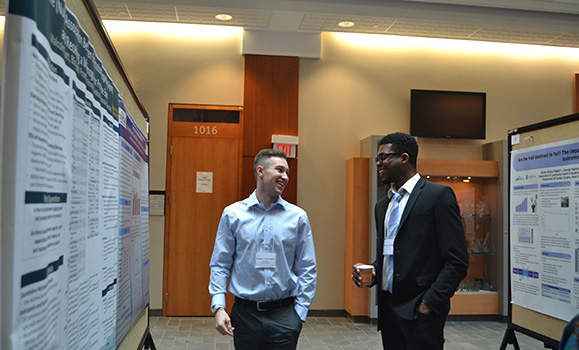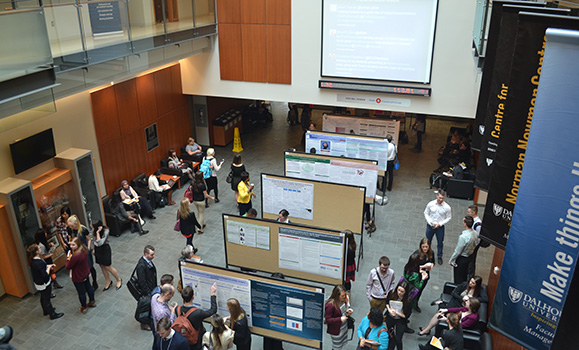Health care is complex. That’s why this year’s Crossroads Interdisciplinary Health Research Conference focused on expanding the horizons of health and planning for the future.
Organized and hosted by the School of Health and Human Performance Graduate Society, Dal Crossroads is an adjudicated and peer-viewed event that emphasizes the importance of understanding health through interdisciplinary research. It provides a unique opportunity for undergraduate, graduate and professional program students from across Canada to showcase and engage in discussions about their innovative health-related research.
Since its inception by Dal profs David Westwood and Jerry Singleton 14 years ago, the conference has continued to grow, with the 2016 edition doubling its attendance year-over-year with 130 participants.
“It’s amazing to me how far we’ve come,” said Fred McGinn, director of the School of Health and Human Performance during opening remarks. “I’m always so proud of this conference, not just because it grows every year but because it’s students who lead it, and busy graduate students at that.”
A focus on social determinants
This year, those busy graduate students were led by co-Chairs Julia Kontak and Ella Vermeir, both second year master’s students in Health Promotion. They chose this year’s theme — “Expanding the Horizons of Health” — as a means to promote and encourage collaboration among students, faculty, health researchers and community representatives in health professions. Â
“Our program is focusing a lot on social determinants of health,” says Kontak. “Healthcare involves a lot of different factors outside the health-care system, such as income, poverty or linking mental health with physical health.”

With this in mind, the two-day event featured workshops, poster sessions and oral presentations from participants that provided perspectives from the different elements of health. Keynote speakers and workshop facilitators included Health and Human Performance professors Matthew Numer and Lori Dithurbide, Dal professor and Canada Research Chair Christine Chambers, and health promotion specialist and Dal alum Emily Drake. Presentations ranged from topics of LGBTQ health, breastfeeding, knowledge translation, sexual safety, immigrant health and mental health. Vermeir says the conference welcomed such a diversity of presentations to ensure participants were able to engage with a variety of different perspectives.
“Especially when you’re a graduate student, it’s very easy to get narrowed into what your project is,” she says. “In a conference like this, we hope it kind of opens people’s eyes to see that health is bigger than just one component.”
Showcasing research
In addition to the student-centric activities, the conference featured keynote addresses by occupational therapist Becky Marval and Nova Scotia Health Authority President and CEO Janet Knox. Marval spoke about the complexity of health promotion among those whose basic needs are unmet, and Knox discussed the Health Authority’s strategic plan to improve health outcomes across the province.

“We wanted to focus on all the different levels of health care — the individual, the social relationships, the community and the policy — and I find that Dal Crossroads brings those all together,” says Kontak. “To be able to look at all those different research components and bring them together, it’s very interesting to see.”
In the wake of a successful conference, both co-chairs hope those who attended were able to take away the theme’s message and apply it to their own research. They also hope Dal Crossroads will highlight the innovative research going on at the university year-round.
“The fact that we’re able to grow this conference every year says something,” says Vermeir. “By showcasing Dal and the research that’s going on here, we hope that people traveling from other universities might choose Dal for their graduate program.”

